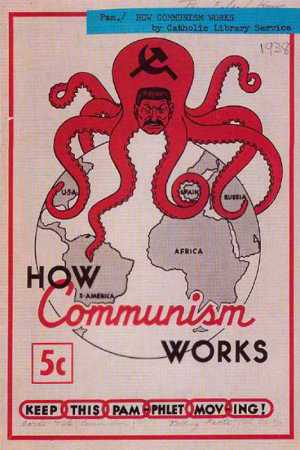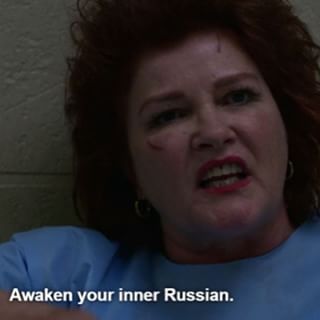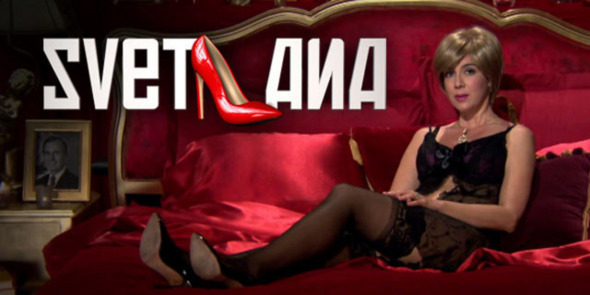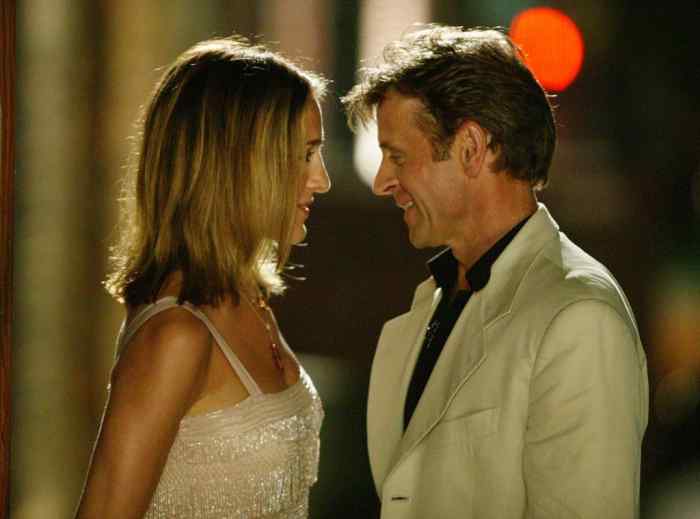Russian Stereotypes in American Television

Since the ending of World War Two, America gained it’s power and dominance as the epoch of western society. Prosperous and democratic, the country’s mission seemed to be to spread its Western enlightenment and destroy or convert the “enemies”. Along with its political agenda, American culture turned to its entertainment industry to further carry out the country’s ideals. Russia, the largest country in the world, had also become the greatest threat to the new American Dream idealistic society. The land and its people were marked as communist enemies of the west, and so naturally, this became depicted through American culture and media. It seems that American media birthed the recurring archetypes of a typical “Russian”, that now seemingly the whole world follows.
Through the use of growing media outlets in the country, America began a propaganda war against the barbaric immigrant with a funny accent. It is important to review this conflict between the two countries throughout history in order to understand the source of negativity towards Russia and its people. However, even in modern day society, the stereotyping has remained, and a Russian dressed in a leather jacket seems to be the go-to antagonist in television. Television shows such as Sex and the City, 2 Broke Girls, the Big Bang Theory, and the Americans are examples of shows that were filmed post Cold War, but hold the Cold War enemy close to their script.
An author of the American Journal of Sociology by the name of Arthur K. Davis states that America’s hostility towards Russia lays in its own shaky foundation of a country and its history with racism. Davis states that America’s hostility is defined by its “Calvinism, latent racism, and by the tradition of isolationism.” America as a country was built upon immigrants themselves who had worked to build a country of freedom, independence, and isolation. Davis states that Russia’s role of minor opposition was threatening to America, who was determined to become the next big superpower of the world.
And so, moving forward from the political battlefield, American media and particularly television, has birthed three Russian archetypes. The KGB mobster, the Prostitute, and the Pessimistic Drunk.
The KGB
In turn, the first archetype that was born in American media is the KGB criminal. The archetype maintains that most Russian men, are affiliated with the Russian mafia, or the KGB. The KGB is a notorious, and often times infamous, intelligence and security police of the Soviet Unions. The KGB included 500,000 members at its prime, and its role was to gather intelligence in other countries, and suppress the countries internal resistance. This often harsh and large organization left America to become weary of “Russian spies”, and believed Russia was violently suppressing cultural and social growth among its nation.
Two popular shows that exemplify this stereotype are Allegiance and The Americans. The show Allegiance follows a detective who is specializing in Russian affairs and has direct family ties to the KGB. The show follows the main character and his ex-KGB parents, and essentially covering up a plot to destroy America. The Americans, is about the first hand account of KGB officers, following a KGB couple living undercover in Washington. Being in the perspective of Russian KGB associates is what makes these shows alike. However, even while the plot is about Russians themselves, they are still portrayed as enemies to the West, and gives the viewers of the shows a chance to be uncomfortable whenever rooting for the Russian characters. However, countless television shows maintain the Russian KGB or mafia stereotype as the enemy, whether to the country, or to a street gang. The acclaimed show the Sopranos featured the Russian mafia as a recurring enemy of the DiMeo family. In Sons of Anarchy the mafia is often shown and is portrayed as extremely evil and ruthless. In the new hit series Orange is the New Black, Galina “Red” Reznikov’s back story and reason for incarceration is affiliation with the Russian mob. Countless other hit shows use the Russian KGB, mafia, or mob as a standard antagonist, including Law & Order, Dexter, Firefly, and etc. It seems wherever Russians go, the mafia stereotype follows.

The Prostitute
The second archetype that will be examined is that of the Russian prostitute. This stereotype is directed to the Russian Woman, and usually encompasses portrayals of prostitutes, mail order brides, or sexually promiscuous women. The stereotype holds that a beautiful, tall, blonde hair, blue eyed beauty is either caught up in the world of adultery or chooses it for herself. This stereotype was born out of the often sexualized vision of tall blonde women (a common Russian genetic trait), and the high rates of prostitution and human trafficking in Eastern Europe and Slavic countries.
One such blatant example is shown in the very first pilot of the hit CBS series 2 Broke Girls. In the first ten minutes of the first episode, we are introduced to the main character Max. She is working in a diner with one more waitress named Paulina. And in the very first scene of the very first episode, we are introduced to Paulina, though we never see her because she has disappeared. Max goes to find Paulina, only to find her in the storage room having sex with an unknown man during her shift. Further, the next day when Max comes to work, she finds out that Paulina was fired. This was told to Max by the diner DJ named Earl, who makes a Vladimir Putin joke. “Big News! The new boss fired that Russian waitress, Paulina, turns out that Chessie Kournikova was Putin it out!”. This line “cleverly” uses a pun of using the name of the controversial Russian president synonymously with “putting it out” a slang term in modern culture which refers to a woman giving up her sexuality to a man.
Paulina in this instance is also not called by her name, but rather by an American equivalent of a lochness monster “Chessie” and a popular Russian last name (and that of a famous tennis player) Kournikova. This ties in to further make a statement about Paulina’s “Russian-ness”, and how she is a degrading woman who cannot even be called by her name when being teased. Lastly, all within the first 10 minutes of the episode, the new waitress that was hired in replacement, is given Paulina’s old uniform. A fake studio audience roars with laughter when the new waitress says she wants a new uniform, since Paulina’s old uniform is “still moist”, is “covered with mustard stains… and various other stains” and finishes off the rampage with “god I hope that smell and stain is clam chowder!”
Additionally, a recurring character in the show is a washed up fry cook named Oleg. Oleg’s only lines and additions to the show is that he is constantly sexually harassing the female workers and trying to lure them into sex. This shows another stereotype which relates to the Russian man being shown as a hyperactive sex maniac who is associated with the mob and sells mail order brides.
The final example of the Prostitute trope is the 2010 show titled Svetlana. The show follows a brothel madam and a prostitute. The entire show is centered around the funny comments Svetlana makes about her prostitution, love for sex, and her fat mother who opened a brothel herself in Ukraine when Svetlana was young. In many of the sex scenes on the show, there are symbols (either on the walls, or on objects) of the Soviet flag.

The Drunk Pessimist
The third and largest archetype that will be examined is the Russian Meanie, the generally drunk and pessimistic character. These characters serve as stereotyping the Russian people and their mentality, rather than the lifestyles they lead. As Russia’s consumption of Vodka (considered in popular culture as a heavy liquor) is extremely high, Russian people are often considered to be drunks. Russia is also known to have some of the lowest tempertures in several northern cities around the world, and leads to the correlation of cold weather with cold people. This is perhaps the most important archetype to examine because it is likely the one who serves the most damage to a brainwashed TV audience who will believe all Russian people are cold and bitter.
One show that has fed on this trope significantly is The Big Bang Theory. Though it is a hit show, once examined, many racial comments are made that can leave a viewer of the mocked culture feeling uncomfortable. The show took a stab at Russia and the Soviet Union when one of the main characters, Howard Wolowitz, is commissioned to go into space to work on the Russian space station. In order to do so, he has to go to Kazakhstan and work with Russian engineers and astronauts. Before he even departs on the trip, he makes endless jokes to compensate for his underlying fear of going on such a big journey. Making several references to the risk of going on a Soviet shuttle, built by the same people who were responsible for Chernobyl, a devastating time in period for the Soviet Union and USSR.
Additionally, another main character, Leonard, makes a joke stating that “When was the last time you were at Best Buy and you heard someone say, oh, check out this Blu-ray player, it must be good, it was built in Russia?” in a sarcastic tone. Finally, near the end of the season, when Wolowitz finally makes it to the Kazakhstan, he is shown to be tormented by the bullying Russians, who constantly joke about Wolowitz and his petite stature.
The main Russian astronaut with him, named Dmitri, is pictured with a low husky voice with a thick accent, constantly commenting on his own superiority and ability to withhold a lot of alcohol and extreme colds.
And finally, a TV show that perfectly encompassed the miserable and cold hearted Russian was the majority of the 6th and last season of Sex and the City. Carrie, the main character, begins dating a tortured artist by the name of Aleksandr Petrovsky. He is portrayed as brooding and self-absorbed, and acts coldly towards Carrie. Petrovsky is often pictured breaking down emotionally, and being very emotionally consuming. Aleksandr’s Russian persona of being cold, just like the Russian cold, was fixated on when Carrie finds out her best friend Samantha has cancer. Aleksandr responds to this very bluntly, stating that Samantha may die, showing little coddling. During a conversation with her girlfriends, Carrie attributes his “Death, get over it!” attitude to him being Russian, and not to his general character as a person. In the finale of the season and the show, when Carrie and Aleksandr move to Paris and he is shown to be neglecting her, he is shown as being violent as well. During a fight, he swings his arms, and accidentally (or not so accidentally) smacks her across the face. This further attributes to the stereotypical Russian tough love persona.

Overall, perhaps it is too optimistic to hope that one day cinema and broadcast will be free of racial slurs and stereotyping. And perhaps America is no longer using the Russian antagonist for political propaganda, but rather using it out of habit. It is all too easy to associate a villain with a Russian person, who comes from a reportedly cold place, with a corrupt government, where guns and alcohol are widely available. Perhaps, if Russia one day would become a completely free and democratic state with bans on alcohol and an optimistic flare, America would still use the Russian trope purely as a historical figure, to remind viewers of the scary past of the Cold War.
What do you think? Leave a comment.











I once saw a Russian movie, can’t remember the name, where this old lady sees her drunk husband on an alley and is helping him get on his feet, when he asks “Why you’ve been with me for so long?”, she says “Because Russian women love out of pity”. I also saw Matrioshki and saw how stupidly easy was for human traffickers to get girls from East European nations to become or force them to become prostitutes, and that was a Belgian series.
So I don’t think the stereotypes are only showcased by American TV, pretty much all of Europe has the same stereotypes. It has to do with the “We’re rich, you’re poor” thing that came out of the Iron Curtain collapse and the end of the Cold War. Yet I am a believer that even the most outrageous stereotypes have certain facts within them.
This is fantastic. There is so much racism that swirls around in the media that we forget that that title can be applied to depictions of Europeans as well. I think this was extremely well thought out and brings up many substantial and important issues.
I think it is dependent on the time period. Russian stereotypes were popular during the Cold War era just as derogatory representations of the Japanese within American cinema/animation during WWII.
Next time you catch yourself watching a movie or tv show that has a villain from another country, remember that it’s just entertainment and that it does not necessarily reflect that culture accurately.
As a Russian-Canadian, I have no problem with Russian villains – after all, Russians aren’t the only anti-heroes in Hollywood films. However, I do have a problem with the fact that they are consistently portrayed as only one archetype.
There are stereotypes about the Russians, but they’ve been yesterday’s news long ago.
When you live in such a multicultural world, in most of the cases you’re taken for who you are, not for the idea of who you must be based on where you’re from.
Very interesting article! I learned so much about Russian stereotypes from this article, and I’m glad I read this piece! Good job! It’s also nice to see another person from Ryerson on this website 🙂
Stereotypes are just another way of making a two dimensional character and to set up cheap jokes. I hope too that the future will give us much more diversity!
Recently, in Avengers 2 the twins were given much greater depth. They had their own personal reasons for hating Stark, and they were on the threshold of good and evil (not to be confused with Avengers and Russia) until the end. I’d like to see more of that.
Hollywood still finds a way to portray Russians as villains in their work. End it already.
Probably the greatest stereotype of them all was perpetrated by the Soviets themselves, when they said that Moscow, one of the gloomiest cities in the world, at least at the time, did not believe in tears. It did work, didn’t it? They did get the Oscar, and the gullible Americans swallowed it. So, why not now?
In the end, it’s all cliches, and it’s all in the movies. Keyser Soeze, that epitome of a Hungarian (inexistent) cliche, used to say that the greatest trick the devil pulled on mankind was to make it think he does not exist. Does he?
Not All Americans are not buying into the BS the media pumps out about Russia and Russian people.
In America so many groups are “protected” now and you cannot make fun of them without risking some kind of lawsuit, boycott, or prosecution. Eastern Europeans are still fair game, it seems; not only are they white people, but they are mostly Christian, two groups that can still be humiliated on US television without question.
well – how come all those tv series in the 70’s eg Hogans Heroes had the Germans speak perfect english….
The Television in the US is a self destructive force of propaganda!
Stereotypes are not our enemies, I would say, since they help us to distinguish ourselves from the other cultures. There are national stereotypes, local ones and evne private ones, created by the society to have an anchor for what is the norm and what is seen as something of kilter. I also think that if we are completely honest most of the stereotypes are actually correct considering that we cannot aply them to an individual, but only to a nation overall. Similarly to the saying that an individual thinks, but a crowd has a behavior of a heard.
Enjoyed reading the article, since I was not aware of all the references that are still present in the television.
Thank you, I enjoyed reading this article. All cultures have something that other cultures extract and “blow up.” Even if it is something very small, restricted to a district or portion, if it gains headlines and popularity (positive or negative) it will become the focus of an entire culture. Then other aspects, the important and valid ones, will be undermined and shadowed. The Russian culture is a perfect example. Many people cannot distinguish propaganda from how things actually are.
America certainly has it’s stereotypes and I’m not saying that the Russian bad guy isn’t one, but the problem is that ALL countries have their stereotypes of other nationalities. Does this Russian bad guy image stem from the Cold War, yes. Are we over the Cold War? Most definitely. But Hollywood is not alone in portraying a bleak image of it’s former enemies.
This is something I always think about when I watch super played out sitcoms and lazily written TV and I’m glad you brought it up. As a nation, we are incredibly sheltered to the real life stories coming out of different countries, especially ones across large bodies of water. Addressing this subtle racism is the first step to breaking it down so, thanks for the great article.
I love how much I learned from this article. Great job 🙂
I like what you said at the end. Is it to optimistic of hope to live in a world where stereotypes don’t exist in media. Maybe, maybe not. The thing is, is that stereotypes cant even be considered a positive thing. Even if it’s “Asians are good at math”, because as soon as someone is categorized by their race or ethnicity you strip them of their agency and sense of self. With that said it can happen in media. We just have to find a way to teach everyone about all racism so people begin to question the stereotypes they consume. Then get thenough same reality in the heads of CEO’so in big corporations.
As a first-generation Russian immigrant in the US I would love to see Russian characters who are nuanced and three-dimensional, and not just the same stereotypes over and over again. I’d especially like to see stories about Russian immigrants such as my own family and joys and struggles that come with being an immigrant.
The brainwashing of the Cold War stereotypical villains begins early and continues for decades. Don’t forget the Rocky and Bullwinkle. The main antagonists are Boris Badenov, a “sophisticated” pun on a former Tsar, Boris Godunov, and Natasha Fatale, as in femme fatale. Rocky and Bullwinkle started in 1959. Maybe back in the 1950s these stereotypes were fostered due to the Cold War but this cartoon has consistently ranked among the top 11 during the last almost 60 years. The latest remake in movie form was 2000.
Hollywood is rife with stereotypes: Latin Lover, Middle Eastern Terrorists and the White Savior. The most prevalent is the powerful bad dude with the British accent.
I think these stereotypes exist as laziness on the part of the writers to get a quick laugh and who out of ignorance do not know how to write for these groups. One way to actively change that is to have Russian writers write for the characters. Another way is to give actors the flexibility to express themselves using language that they would use in real life. While this might not help with stereotypical characterization, it would at least give some voice to the characters. When Prison Break was filming, the writers of the show told the Black actors that they did not know how to write effectively for Black characters. So what they did was they told the actors what the writers wanted to convey and the actors spoke in words that would be true to their communication style (watch The Making of Prison Break for this information).
Writers in Hollywood need to collaborate with the groups they work with because in this age of worldwide cinema releases, the LAST, VERY LAST result any movie maker should want is to alienate a global audience. Perhaps they can learn from the phenomenal success of the Fast and Furious franchise which has an international cast working together and churned out 7 installments on the same theme. We need less fostering of old bad blood and more up to date characters. I am not Russian and I don’t think you have to be to agree with the entire spirit of your article. Kudos to you for pointing this out!
Sooooo True
It’s not just Russians who are portrayed this way. Most Slavs, especially from Balkan are portrayed this way.
I can’t remember a SINGLE US movie or a book with a Slavic character where that character wasn’t a criminal, drunk, prostitute or such. I’ve just finished a fantasy book, which is praised for great characters and great writing. All characters there were Americans – except one. A drug adict and smuggler, forger, thief and murderer – a son of a Bulgarian mobster.
Or take Marvel movies, like Avengers or Iron Man, with their obscure European countries with vaguely Slavic-sounding names, which are always poor, dirty, full of crazy villains, and just waiting to be saved by an American Hero…
That’s not just ‘laziness’, that’s blatanat ethnocentrism – the belief in the inherent superiority of one’s own ethnic group or culture, in this case superiority of American’s culture over Slavic culture.
Don’t forget the cartoon characters where every criminal has a Russian accent and name.
Petrovsky is also filthy rich, which is another Russian stereotype, like billionaire Yuri karpov in “2012.”